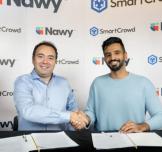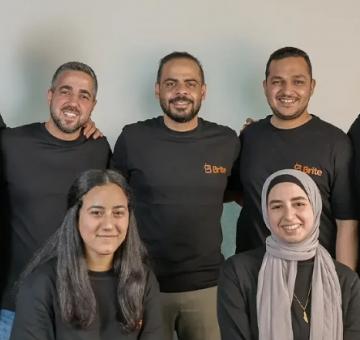5 lessons an entrepreneur can learn from Fawry’s acquisition

The news break in November was Fawry’s biggest deal, Egypt’s first e-payment platform that got acquired for 100 million dollars. Ashraf Sabry, Fawry’s CEO told EgyptInnovate the inside story. Here we tried to capture how Fawry could land such an offer and what entrepreneurs can learn from the acquisition.
What's the story behind starting Fawry?
Before Fawry, we were working on a project based revenue company and we wanted to shift to a recurring revenue company. Project based revenue is when your company bids for a project, you start implementing it afterwards you receive your money, recurring is when you gain revenue along with the transaction immediately.
Working on a project based companies is always subject to fluctuations, hard financials and a lot of technical issues, thus the pattern of business is not easy then.While the recurring revenue has more continuity and is easier financial wise.
This was the ignition of the idea, then we started to think what businesses have a recurring nature, after research, we found that bill payment and e-services is what we are looking for and shall be our next step.
1. Hard work can open locked doors, if you believe in your idea, keep knocking.
Sabry recalls the challenges that faced the team, at the beginning, we faced the normal challenges any starting business faces, convincing people with your idea. We were trying to convince the shareholders to create a platform that will enable individuals to pay their bills from the nearest grocery market or pharmacy, no one believed this could happen.
According to Sabry, Fawry’s first challenge was to convince the founding investors with the idea of the e-payment business in Egypt. Secondly, convincing customers like Vodafone and Egypt telecom and Egyptair, that the public will use this service, it wasn’t an easy mission.Then comes convincing the public to use an untraditional e-payment method and feel secure paying with their credit cards online.
Finally, they were questioning if they were going to create their own technology or buy an existing one. We had good researchers, who became partners afterwards, they researched the available technologies and we found that it won't be the best option for us, so we decided to build our own technology and hired a good technical team. Our decision was built on research and resources forecasting.
It took some hard work, till the doors started to open one after the other.
2. Persistence with flexibility is the secret ingredient
On how Fawry overcame these challenges, Sabry explained, persistence was the most important factor for creating a service in a non-existing market. The case wasn’t only in the market, it was also a matter of cash. At a certain time any team will run out of cash, that’s why you need to create a good track record that can support you at that time.
He elaborated, "Start when you have an enough amount of cash that will help you create a track record, by which you can convince your investors to join you for another round. You can’t say that your project requires 7 million EGP to start and will start as soon as you get two million, probably you won’t reach anywhere."
Finally, the team was flexible enough to accept lower margins and once the idea became more mature, targeted customers agreed to join them, but again that required a lot of compromising at the beginning.
3. If you’re going to work with the government, pack for a long journey
As part of Fawry’s services, they had to work with the government. Sabry told us that was very challenging and it needs the team to be prepared for it. He continued, things that require a month could take up to 12 months. It was a long journey, not a one shot deal.
His advice to entrepreneurs who want to work with the government is to find sponsors from the government, not just nice people who like the idea. He must have influence and authority to support them with actions. Additionally, they have to be nagging, nagging, nagging till they reach their target.
4. “Luck is what happens when planning meets opportunity”- plan before you jump.
Sabry recalled the inside story of the acquisition and how they went through the whole process. After your investors spend 5 years with your company, people start to think of moving out or selling their shares. At the beginning, people offered to but Fawry for an amount of x, some of the investors agreed to the offer. The management team thought to wait and they carried out a structured planning process, framing what they have and knowing what they want. Afterwards, the investors offer was maximized by 1.4 x.
Although Fawry is a 5-year-old company, the company’s life span is not always an indicator for success. Investors seek good management, the opportunity of growth and a good record of financials.
He continued, “If you have some patience and courage to walk a more structured process, you can reach a great satisfying value.”
5. Achievements are not measured by numbers only
"What's next for Fawry is introducing new products, exploring more markets and enhancing their technology. Since the team is working with technology it's a continuous evolution, we can’t stop. And if you stopped innovating, you die.", Sabry explained.
"We believe that Fawry has the technology and the know-how that can help them expand in more markets regionally and globally not only local markets". On Fawry's biggest achievements Sabry said it was establishing a strong brand in a very short time, building an organization that can continue and having the right people and a prudent management. This was reflected in building a platform that is carried 1.5 million transactions till now.
And finally, “Smooth seas do not make good sailors”
Sabry’s advice to entrepreneurs was to start now and keep in mind that they can start at any time. “Exploit your idea well, research what was done before and what are the challenges of this idea. If you decided to take the entrepreneurship journey, consider the risk and know that it requires very high persistence. “Nice” ideas only do not make clever entrepreneurs.”
He added, “Search for the right partner and always focus on hiring the good people. It is always people, people, people and partners, partners, partners!”





































































EgyptInnovate site is not responsible for the content of the comments